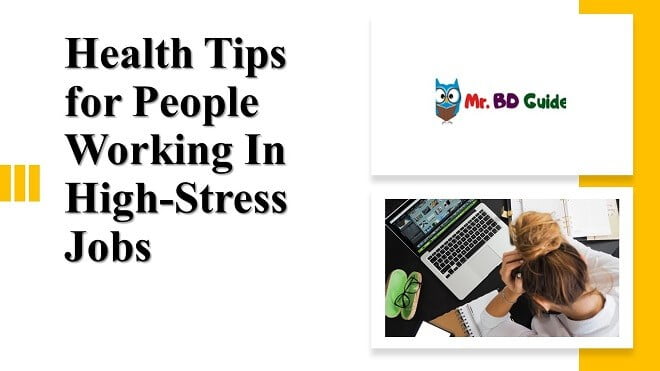12 Health Tips for People Working In High-Stress Jobs

Stress at work can lead to a drop in energy levels, performance difficulties, and tense relationships. There are, however, ways to manage it and prevent its effects.
Stress is a natural reaction to pressure. Even though you can’t eliminate all stress from your life, you can manage your reactions to it.
12 Health Tips for Managing Work Stress Right Now
Managing stressors immediately instead of allowing situations to escalate is one effective way to manage stress at work.
The following tips may be able to help you in your workplace, even if some things are beyond your control, so they may be worth trying.
01. Taking Short Breaks
Take a break or distance yourself from the source of your immediate stress at work if possible.
Consider these options if you are unable to leave your workplace:
- Taking a bathroom break
- Making tea or walking around for a minute
- Taking a few minutes to switch tasks and pause the activity that frustrates you
- Relaxing with a 1- to 5-minute YouTube video
You may not be able to move around or leave the place in every work environment, but consider ways you can take a mental break. Consider focusing on a nearby object and trying to identify all the details it has.
02. Don’t Find Escape in Harmful Habits
Many people turn to smoke or drugs for temporary relief. However, these actions can quickly turn into habits, and you may not know when you have spiraled down the path of addiction.
It is better to steer clear of any harmful habits you may have adopted to release stress. If you feel it’s too late, contact a rehab facility such as Delphi Health Group for detoxification services and give your life a fresh start now.
03. Exercises for Deep Breathing
Try deep breathing exercises as soon as your stress levels rise.
At the moment, breathing techniques can relieve stress and tension, benefiting your mental and physical health.
Consider breathing as often as possible since you can do it anywhere (including a restroom cubicle if necessary).
You can calm down quickly with several breathing exercises, such as:
- Using the box breathing technique
- The 4-7-8 method
- Breathing mindfully
04. Keeping a Journal
Journaling has been proven to be beneficial for mental health, and it has been shown that keeping a journal can relieve stress at any time, according to a study published in 2021.
Keeping a journal can be as simple as setting a five-minute timer and writing down your frustrations and worries. Consider a journal prompt if you don’t know what to write.
A journal can be kept on a phone, a computer, or on paper.
05. Walking Outside and Going for a Walk
The mental health benefits of daily exercise can’t be overstated.
In 2017, research found that exercise can affect the parts of the brain responsible for mood regulation and stress management.
All physical activity can indeed trigger the release of feel-good hormones such as endorphins, dopamine, and serotonin.
Try stretching in your sitting spot, taking walks before, during, and after work, or going up and down the stairs if you are unable to exercise regularly.
You might also find some stress relief by going outside. In a 2019 study, researchers concluded that even sitting down for 20 minutes outside can reduce stress.
If you walk to work, eat lunch outside, or spend time at the park after work, that might be what you do.
It may also help you manage stress at work by looking out the window and focusing on the sky, trees, birds, lights, or anything else you can see.
06. Music
In a study conducted in 2021, listening to music for 10 minutes can lower cortisol levels and improve mood, particularly if it’s your favorite type of music.
Listen to your favorite tunes during your breaks and on stressful days while you work or commute to and from work.
07. Meditation
A meditation practice can help you achieve mental and physical relaxation, according to the National Center for Complementary and Integrative Health (NCCIH).
There’s no need to spend an hour meditating. Take a break from your desk or use the restroom to practice your favorite meditation.
A positive affirmation can be mentally repeated for three minutes after focusing on your breath for one minute. Alternatively, you could write this affirmation down on a Word document and read it aloud while focusing on the screen.
08. Resting
You may have trouble sleeping when you are stressed. A lack of sleep, however, may lead to an increase in stress levels.
It is also possible to have difficulties focusing and performing at work if you are sleep deprived.
Maintaining optimal sleep hygiene can help you manage job-related stress. Consider reaching out to a health professional for sleep management solutions if you have a condition that affects your sleep patterns.
09. Identifying Patterns
You can manage long-term stress more effectively if you identify your stressors and prepare for them ahead of time.
For example, if deadlines make you stressed, you could request a longer lead time or start sooner. You can automate some tasks if you lack time to complete them.
Consider spending some time outside work reflecting on this if it’s impossible at your workplace.
Take the time to write down everything that typically causes you to stress at work. You should write two possible solutions to each stressor in advance.
10. Focusing on Your ‘Big Yes’
Overwhelmed at work might be a good time to forego extra responsibilities. It may also be a good idea to let go of volunteer positions that do not bring you joy or opportunities.
Focus on your “big yes.” These are the things that bring you great joy or your key responsibilities. Next, if possible, refrain from accepting anything else you find that doesn’t meet these two criteria.
11. Setting Boundaries
Setting boundaries at work might be helpful. By establishing these boundaries, we can:
- Limit your working hours (e.g., don’t work after 5 p.m.).
- What types of tasks you’ll or won’t do
- How much work to take for the day
- If you are available to respond to emails or chats
Instead of adding more pressure to your day, think about doing it in your personal life if it isn’t possible to do it at work. You can compensate for some of the stress caused by this by using relaxation techniques on your own time if setting your own ground rules isn’t possible.
12. Managing Your Time
Your workload may be reasonable, but you still find it difficult to accomplish everything.
Consider exploring time management practices that may make you feel more in control in this situation.
Conclusion
When you anticipate stress at work, especially in a non-supportive work environment, you may find it easier to deal with. Developing your stress management toolkit is one way to accomplish this.


